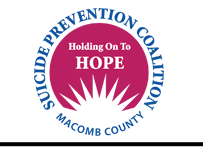1. Develop broad-based support for suicide prevention across the lifespan.
1.1 Continue to cooperate with the Michigan Suicide Prevention Coalition and the implementation of the statewide Michigan Suicide Prevention Plan.
1.2 Maintain the Affiliated Collaborative status with the Macomb County Human Services Coordinating Body and take advantage of the benefits that the status offers.
1.3 Broadly promote the updated Macomb County Suicide Prevention Plan to local stakeholders (e.g., the Department of Health and Community Services, city councils, school superintendents, health care organizations, senior and youth organizations, etc.).
1.4 Increase partnerships with various organizations and agencies (e.g., senior services, faith-based groups), including public and private schools across the county.
1.5 Continue to cooperate with media sources to promote effective suicide prevention efforts
2. Heighten public awareness with a more informed understanding of mental illness and suicide while utilizing strategies to dissolve the stigma.
2.1
Utilize various media sources and public information venues to encourage help-seeking for mental health concerns (billboards, cable TV, newspaper articles, social media, health fairs, etc.).
2.2 Support existing programs and events in the county that promote awareness, prevention, and stigma reduction.
2.3 Partner with media to help them improve the reporting and portrayal of suicides, mental illness, and substance abuse.
2.4 Encourage participation and training for those who are willing to openly share their personal experiences regarding suicide and mental illness,
3. Improve recognition of and response to individuals at risk for suicide in Macomb County.
3.1 Promote awareness/educational programs across the county regarding suicide prevention.
3.2 Develop strategies to identify and reach out to individuals in the community who are more isolated due to disability, age, language, cultural identification, or lack of employment.
3.3 Develop and promote both targeted and general suicide prevention materials.
3.4 Advocate for improved quality of treatment and easier access to services.
3.5 Identify and share best practices for hospital personnel and other first responders regarding communication with suicide attempters in a sensitive and helpful manner.
3.6 Review and update the MCSPC website to be current on suicide prevention information and efforts in our community.
4. Foster the development and implementation of suicide prevention procedures for key gatekeeper professionals.*
4.1 Identify and promote best practices for lethality assessment, suicide prevention, and intervention while allowing for appropriately tailored applications and creative improvements.
4.2 Identify and encourage training and information programs that address successful clinical practice in serving those who are depressed and/or suicidal.
4.3 Promote use of lethality assessment in youth and adult detention facilities.
4.4 Conduct an ongoing survey of current research in suicidology for information that may improve or broaden prevention efforts.
5. Encourage proactive policies, procedures, and activities that address the seeds of suicidal behavior across the lifespan.
5.1 Promote evidence-based early intervention strategies for children who have experienced significant childhood trauma or abuse/neglect issues.
5.2 Support K-12 age-appropriate programming and methodologies that address suicide risk factors (e.g., substance abuse, bullying, legal issues, failing grades, and depression) and protective factors (e.g., self-esteem, healthy relationships, coping skills, impulse control, and social assimilation skills).
5.3 Support community education programs that address issues pertaining to the developmental and transitional phases in life, such as young adulthood, postpartum depression, mid-life crisis, divorce, menopause, retirement, and loss/grief.
6. Promote safer environments and reduced access to lethal means.
6.1 Train primary care physicians, emergency room personnel, and other health care professional to routinely assess those at risk for the presence of lethal means (e.g., firearms, ropes, knives, substances), and provide appropriate referrals and information to the patients and their families on ways to reduce risk.
6.2 Conduct or support awareness campaigns among the general adult community regarding the risks associated with firearms in the home and the importance of safe storage.
6.3 Identify and examine community sites where suicides occur to recommend measures to improve safety and lobby for safer environments.
7. Reduce the negative impact of completed suicides on families, schools, and others in the community.
7.1 Increase public awareness of existing programs working with survivors (e.g., Survivors of Suicide and Sandcastles).
7.2 Promote the expansion of the LOSS (Local Outreach to Survivors of Suicide) program which provides immediate intervention to survivors following a loss from suicide.
7.3 Investigate, acquire, and distribute age-specific bereavement support and resource materials to funeral homes, hospitals, and churches.
7.4 Partner with schools to update and enhance suicide prevention protocols.
7.5 Identify and promote best practices that are available for law enforcement and other first responders regarding communication with suicide survivors in a sensitive and helpful manner.
7.6 Promote the use of Critical Incident Stress Management (CISM) services for non-family members exposed to and/or affected by a suicide (e.g., primary responders, emergency room staff, co-workers, classmates, and friends of the deceased).
7.7 Investigate and promote methods to reduce suicide contagion, targeting areas such as schools and media.
8. Utilize data to drive suicide prevention efforts in Macomb County.
8.1 Advocate for the use of a systemic model that uses common language and reporting techniques in the collection of data pertaining to suicides, attempts, and possible suicides that were recorded as another cause of death.
8.2 Collect and review local suicide data on an annual basis to determine trends that may guide the efforts of the Coalition.
8.3 Record and measure the accomplishments, effectiveness, and cost-savings of the Coalition’s efforts while identifying service gaps and systemic issues within the community.
8.4 Collect the results of research from other sources that may be of use to the Coalition’s effort including state and national suicide data.
*Key gatekeeper professionals include, but are not limited to:
Teachers and school staff
School health personnel
Clergy and others in faith-based
organizations
Law enforcement officers
Correctional personnel
Workplace supervisors
Natural community helpers
Hospice and nursing home volunteers
Primary health care providers
Attorneys
Victim advocates and service providers
Social workers
Mental health consumer advocates
Community volunteers
Gun shop owners |
Debt counselors
Hair stylists
Bartenders and wait staff
Mental health care and substance abuse
treatment providers
Emergency health care personnel
Individuals and groups working with
gay, lesbian, bi-sexual, transgender,
and questioning populations
Members of tribal councils and staff of
health centers servicing Native
Americans
Persons working with isolated senior
citizens
Funeral directors |
“It is a well-known public health doctrine that no mass disorder afflicting humankind has ever been eliminated or brought under control by treatment . . . Only successful efforts at primary prevention reduce the rate of distress in the future.”
George Albee, Ph.D., Pioneer in Clinical Psychology
“Never doubt that a small group of thoughtful committed citizens can change the world. Indeed, it is the only thing that ever has.”
Margaret Mead, Ph.D., Cultural Anthropologist |








